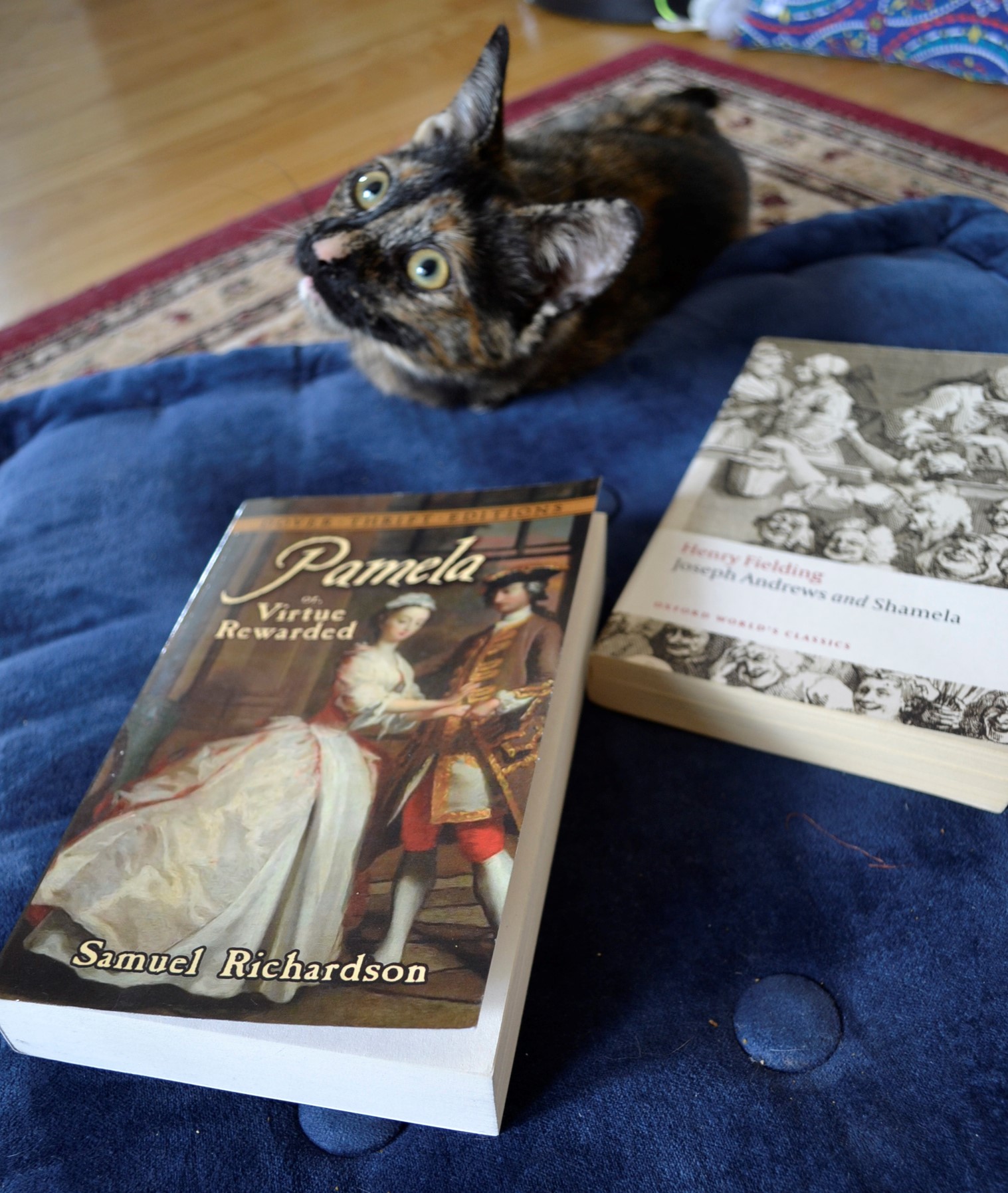November is a Special Month
When my lovely spouse and I were in the process of planning our wedding, choosing a date was one of the first things we talked about. I wanted to choose a day in our favourite time of year (late autumn), and she agreed. Then I asked if we could choose a day in November — the month my grandparents had gotten married in about 80 years ago now.
My grandparents played a huge role in raising me and I spent my childhood watching my grandfather’s constant tokens of affection and care for my grandmother. He never let a week go by without bringing her wildflowers, or an extra something sweet when he shopped for groceries. He wrote her letters when she was in the hospital and was her constant chauffeur whenever she wanted to go out to shop or on errands. He never complained. He never tired. He was always there. He showed me how I wanted to treat my spouse and be treated by my spouse in return.
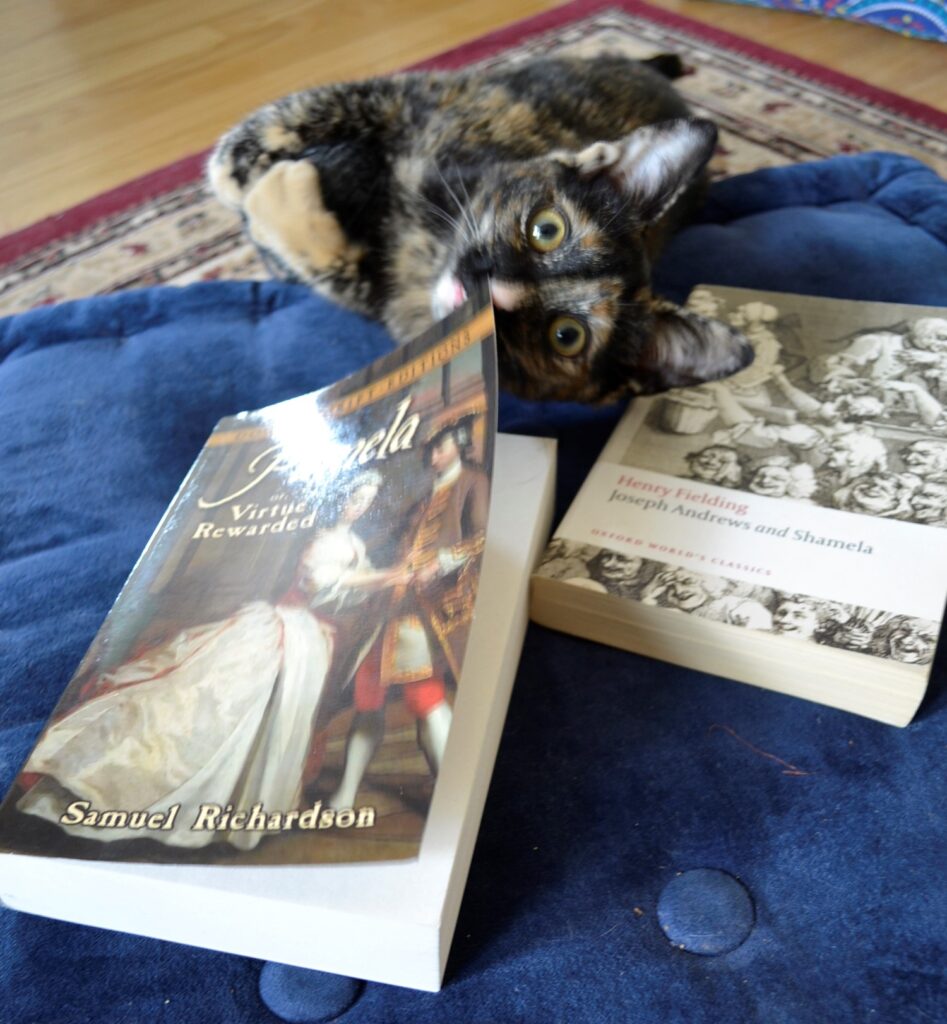
The cold, rainy November day that my spouse and I were married, is and always will be the happiest day of my life. And so, this November, I want to celebrate that with a month dedicated to essential romance novels from classic literature. Romance is not a genre I often read, but these books have made a profound impact on literature in general, and as such deserve their due consideration and analysis.
Three Novels Best Read Together
So I thought it best to start off with what some argue is the novel that started it all, Pamela by Samuel Richardson.
Pamela is about a young servant girl that goes through many assaults on her person and eventually marries her employer — a man far, far above her station. This is a good time to issue a warning that this is an 18th century novel and as such is full of horrible attitudes towards assault, rape, and class, as well as having a profound amount of sexism. Richardson intended Pamela to be an instructive moral novel, in which Pamela is rewarded by an advantageous marriage when she resists her employer’s licentious advances and offers to be his mistress. That same employer kidnaps her, holds her against her will, and assaults her multiple times, yet she still marries him, insisting that he’s changed.
Did I mention that this is an 18th century novel and is full of some very maddening and horrible content?
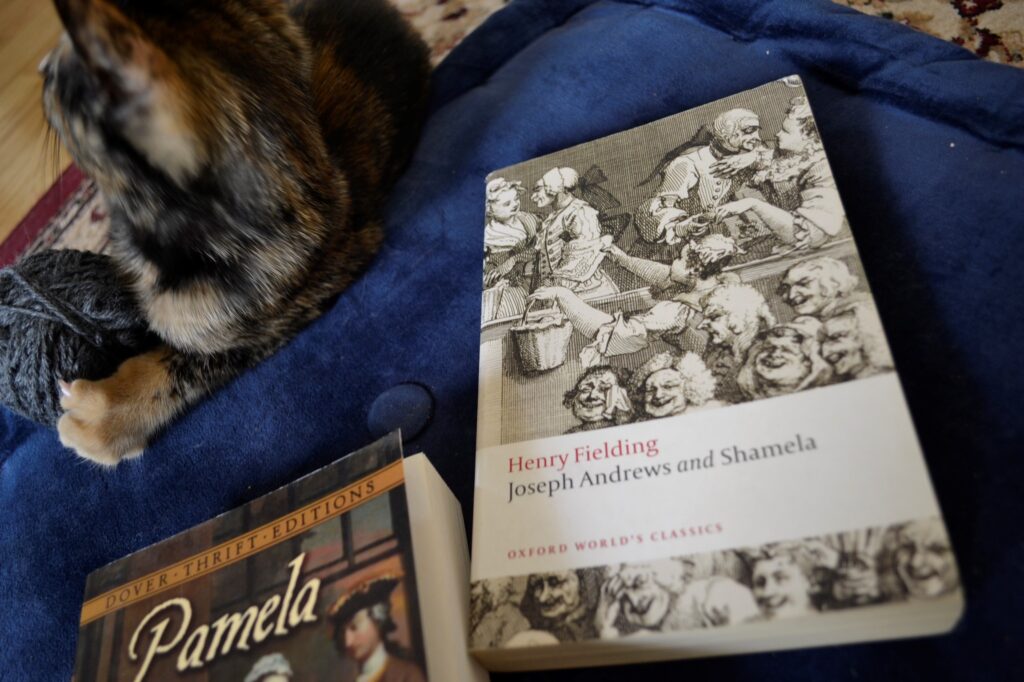
Henry Fielding’s Shamela is a direct parody of and reaction to that very same maddening and horrible content. When you read Shamela, it’s pretty clear that Fielding wrote it frantically and with a lot of anger towards Pamela. Fielding takes Richardson’s writing and premise and pushes it to the realms of the absurd, satirizing the match between Pamela and her employer, Mr. B— (whom Fielding forever marks with the name of ‘Squire Booby’) as well as both of their ridiculous actions and the plot of the original novel. I would recommend reading Shamela right after Pamela as a balm for all of the outrage that Pamela causes.
And lastly, I think a reading of Pamela would not be complete without a reading of Henry Fielding’s Joseph Andrews — who happens to be Shamela’s virtuous brother. The novel follows Joseph Andrews through his many travels and misfortunes, and is both satiric and a very comic novel. Yes, it made me laugh as I read it 277 years after the original publication. It continues to draw from Richardson’s work, but is more than just a parody. Instead, it is satirizing the ridiculous double standards when it comes to male and female conduct in 18th century English society as well as trying to give birth to a new form of novel that is at once epic and ridiculous as well as absurd and satirical.
These three books are really best read together, preferably right after one another if possible.
A Note on the Epistolary Novel
Pamela is written in the style of a series of letters, and while that form as it existed in the 18th century has a lot of strengths, it also has a lot of weaknesses. There are times when it seem over-dramatic or forced. There are also times when it seems limited in terms of perspective and descriptive power. I admit that I find it a bit verbose and stilted. It’s not my favourite structure of novel. But one must remember that it was revolutionary at the time.
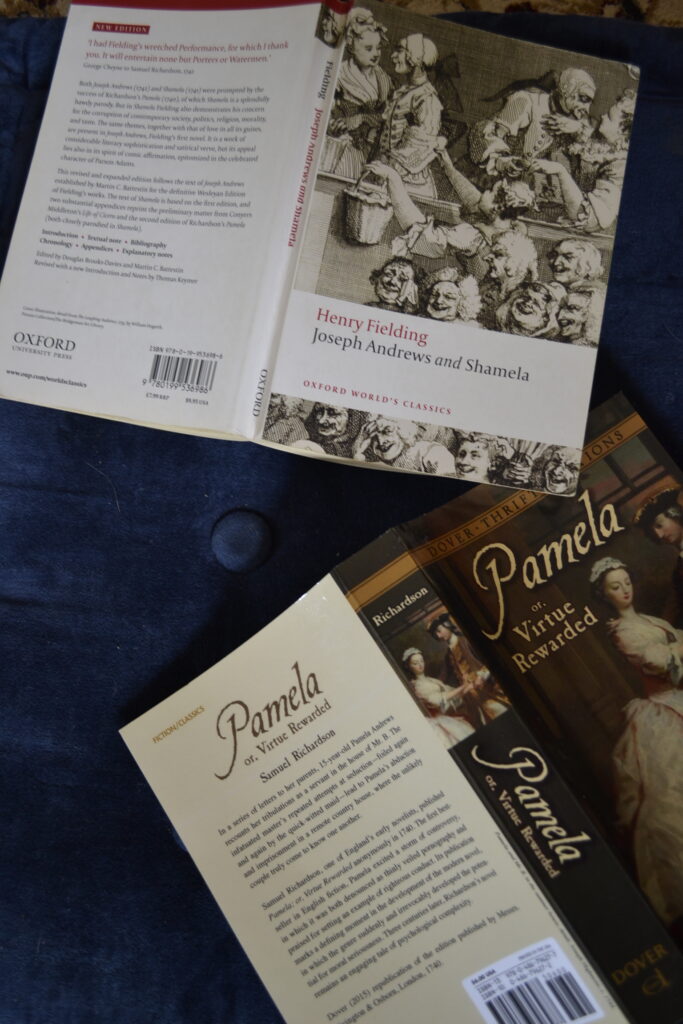
Richardson is primarily responsible for popularizing the epistolary style and, if you at all study literature from this century, you’ll be reading a lot of it — from Burney’s Evelina to Rousseau’s Julie, ou La Nouvelle Hèloïse to Choderlos De Laclos’ Les Liasons Dangereuse.
Why are these books essential?
These books are essential not so much because of what they are in and of themselves, but because of what they led to. They redefined what a novel could be. Pamela is considered the first English novel and introduced what would become the modern novel structure. It was also the first bestseller. Everyone not only read the novel, but they created and purchased merchandise inspired by the novel. Playing cards. Fans. Waxworks. Paintings. Prints. The list goes on.
Fielding took what Richardson started and ran with it, pushing the idea of the novel even further afield. Others followed — Eliza Haywood, the writers of various unofficial sequels. Also, Richardson put forward a rather liberal idea for the time: that individuals could marry that weren’t of the same social class. It’s hard to believe, looking backwards from the twenty-first century, that that idea was so incendiary.
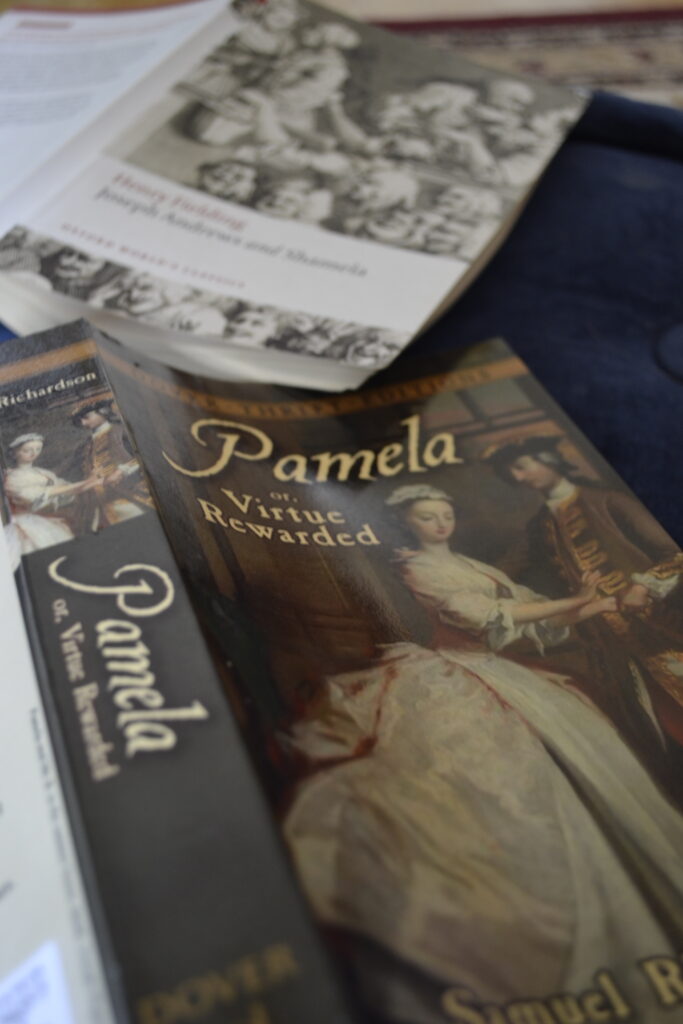
In conclusion, Pamela, Shamela, and Joseph Andrews are essential novels in the canon of English literature and, though it might be challenging, you will not regret reading them — if only to understand the history of the novel and the countless references to them in other work through to the modern era of writing.
How We Celebrate
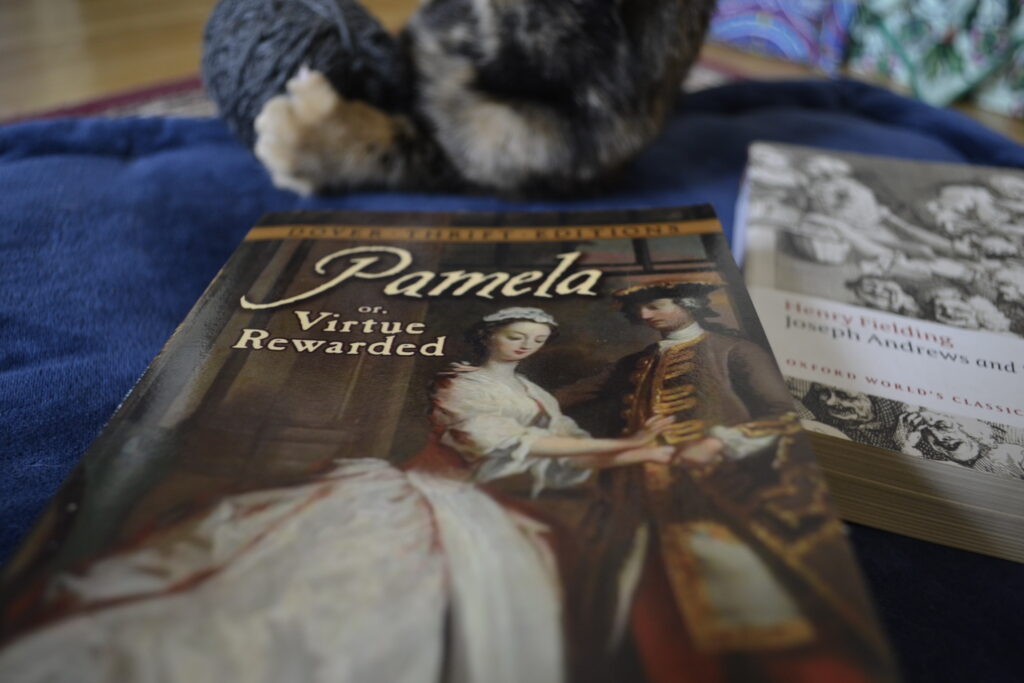
Normally, we celebrate our anniversary very quietly, but this year will be even quieter than usual. I’m perfectly fine with that. I’m perfectly happy to get take out, sit in our wonderfully cluttered living room and be grateful that in this challenging year that we have each other and that we’re both healthy.
